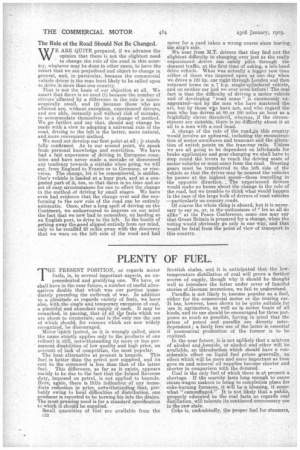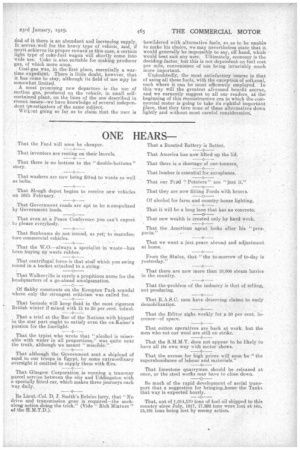PLENTY OF FUEL.
Page 2

Page 3

If you've noticed an error in this article please click here to report it so we can fix it.
TETE PRESENT POSITION, as regards motor fuels' is, in several important aspects, an unprecedented and gratifying one. We have, or shall have in the near future, a. number of useful alternatives double that which was our portion immediately preceding the outbreak of war. In addition to a plenitude as regards variety of fuels, we have also, with the single and temporary exception of coal, a plentiful and abundant supply of each. It may be remarked, in passing, that of all tie fuels which we are about to enumerate, coal is the only one the use of which should, for reasons which are now Widely recognizO, be discouraged.
Motor • spirit (petrol, as it is wrongly called, since the name strictly applies only to the products of one refiner) is still, notwithstanding its more or less permanent disabilities of low quality and high price, on account of lack of competiton, the most popular.
The best alternative at present is benzole. This fuel is better than the petrol now supplied, and its cost to the consurnei is less than that of the latter fuel. This difference, so far as it exists, appears mainly to be due to the fact that the Inland Revenue duty, imposed on petrol, is not applied to bonnie. Here, again. there is little indication of any immediate reduction in price, notwithstanding that, probably owing to local difficulties of distribution, one producer is reported to be turning his into the drains. The most pressing need is for a standard specification to which it should be supplied.
Small quantities of fuel are available from the c:22
Scottish shales, and it is anticipated that the lowtemperature distillation of coal will prove a further source of supply, though why it should be thought well to introduce the latter under cover of fanciful stories of .German inventions, we fail to understand. Paraffin is not likely to become popular as a, fuel, either for the commercial motor or the touring car. It has, however, been shown to be quite suitable for use in agrimoteirs, as well as in motor boats of all kinds, and its use should be encouraged for these purposes as much as possible, .having in mind that the prices of petrol and paraffin are directly interdependent ; a fairly free use of the latter is essential if economical production of the former is to be realized.
In the near future, it is not unlikely that a mixture of alcohol and benzoic, or alcohol and ether will be available, an iiitroduction which should have a considerable effect on liquid fuel prices generally,. an effect which will be more and more importantas time goes on and mineral oil supplies become. shorter and shorter in comparison with the demand. Coal is the only fuel of which there is at present a shortage. If tile scarcity lasts long enough to cause steam-wagon makers to bring to completion plans for coke-burning furnaces, it will be a blessing, if somewhat "camouflaged." It is not likely that a public, properly educated to the real facts as regards coal distillation, will tolerate its continued unnecessary use in the raw state.
Coke is, undoubtedly, the proper fuel for steamers, Lind of it there is an abundant and increasing supply. It serves: well for the heavy type of vehicle, and, if merit achieves its proper reward in this case, a certain light type of coke-fuel wagon will shortly come into wide use. Coke is also suitable for making producer gas, of which more anon.
Coal-gas was, in the• first place, essentially a wartime expedient. There is little doubt, however, that it has come to stay, although its field of use in,ay be somewhat limited.
A most promising new departure is the use of suction gas produced on the vehicle, in small selfcontained Plant, on the lines of the one described in recent issues—we have knowledge of several independent investigators of the same subject. WiCiaut going so far as to claim that the user is -bewildered with alternative fuels, so as to be unable to make his choice, we may nevertheless state that it would generally be impossible to say, off hand, which would best suit any user. Ultimately, economy is the deciding factor, but this is not dependent on fuel cost per mile, convenience of use being invariably much more important. Undoubtedly, the most satisfactory course is that of using all these fuels; with the exception of soft:coal, each where it can be most efficiently employed. In this 'way will the greatest all-round benefit accrue, and we earnestly suggest to all our readers, at the beginning of this reconstructive era in which the commercial motor is going to take its rightful important place, that they turn none of these alternatives down lightly and without most careful consideration.






















